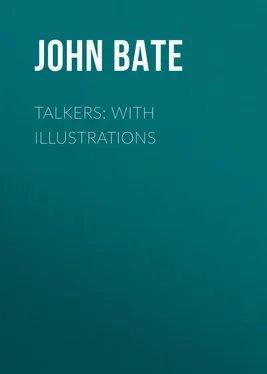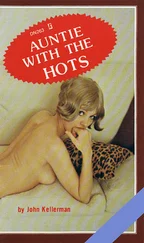John Bate - Talkers - With Illustrations
Здесь есть возможность читать онлайн «John Bate - Talkers - With Illustrations» — ознакомительный отрывок электронной книги совершенно бесплатно, а после прочтения отрывка купить полную версию. В некоторых случаях можно слушать аудио, скачать через торрент в формате fb2 и присутствует краткое содержание. Жанр: foreign_antique, foreign_prose, на английском языке. Описание произведения, (предисловие) а так же отзывы посетителей доступны на портале библиотеки ЛибКат.
- Название:Talkers: With Illustrations
- Автор:
- Жанр:
- Год:неизвестен
- ISBN:нет данных
- Рейтинг книги:5 / 5. Голосов: 1
-
Избранное:Добавить в избранное
- Отзывы:
-
Ваша оценка:
- 100
- 1
- 2
- 3
- 4
- 5
Talkers: With Illustrations: краткое содержание, описание и аннотация
Предлагаем к чтению аннотацию, описание, краткое содержание или предисловие (зависит от того, что написал сам автор книги «Talkers: With Illustrations»). Если вы не нашли необходимую информацию о книге — напишите в комментариях, мы постараемся отыскать её.
Talkers: With Illustrations — читать онлайн ознакомительный отрывок
Ниже представлен текст книги, разбитый по страницам. Система сохранения места последней прочитанной страницы, позволяет с удобством читать онлайн бесплатно книгу «Talkers: With Illustrations», без необходимости каждый раз заново искать на чём Вы остановились. Поставьте закладку, и сможете в любой момент перейти на страницу, на которой закончили чтение.
Интервал:
Закладка:
“Through me, do you say, Mr. Watson?”
“Yes, sir, through you.”
“How can that be?”
“It was you who brought the scandal into the neighbourhood: who told it to Newsman and Reporter and everybody you met with, until your scandal grew as mushrooms in every family of the congregation. It became the talk of all. Many kept from church. They suspected Mr. Good: more than this, they accused him in their conversation of many things inconsistent with a minister; and how could they receive benefit from his preaching, even if they went to hear him? Yes, sir, you have been the cause of the ‘fine times,’ as you call them, in our Church, and not Mr. Good.”
“I am sorry for it.”
“Well, sir, if you are sorry for it, repent of it; forsake the evil of your doing. Give up the itching you have for scandal. Do not repeat things upon mere rumour; you have done more injury in this one case than you will do good if you live to be a hundred years old. Remember, Mr. Webster, what the Wise Man says, “He that uttereth slander is a fool.”
Mr. Webster shrunk away from Mr. Watson as one condemned in his own conscience. He evidently felt the keen remarks thus made; and I hope he became a reformed man in this regard, during his future life.
VI.
THE PLEONAST
“This barren verbiage current among men.”
– Tennyson.The habit of this talker is to encumber his ideas with such a plethora of words as frequently prove fatal to their sense. Some of this class employ fine words because they are fine, with perfect indifference to the signification: others do it from “that fastidiousness,” as one says, “which makes some men walk on the highroad as if the whole business of their life was to keep their boots clean.”
Mr. Hill was a man very much accustomed to talk in this way. He had read little, but had studied the dictionary with considerable diligence. His ideas were few and far between, but his words were many and diversified, long and hard, sometimes connected in the most absurd and ludicrous manner. Most of the illiterate who heard him thought he was highly educated and intelligent, while men of taste and judgment considered him greatly deficient in the first rudiments of correct speaking.
Mr. Hill and his friend Mr. Pope made a call one day last spring upon Squire Foster. As they came to the front door of his house Mr. Hill said to Mr. Pope, —
“Will you do me the exuberant honour of agitating the communicator of the ingress door, that the maid may receive the information that some attendant individuals are leisurely waiting at the exterior of the mansion to propose their interrogatories after the resident proprietor.”
“Did you want me to pull the door bell for you?” asked Mr. Pope.
“If you have that extremely obliging state of mind, which will permit you to do that deed of exceeding condescension, I shall experience the deepest emotionals of unprecedented gratitude,” replied Mr. Hill.
“Why didn’t you say, If you please? and have done with it,” replied Mr. Pope, in a manner which indicated impatience at his gibberish.
The servant appeared and opened the door.
“Will you have the propitiousness, the kindness to stay and communicate unto me whether Squire Foster is in his residence?” said Mr. Hill.
The girl looked vacant, not knowing what to make of his question.
“What does the gentleman mean?” asked the servant of Mr. Pope.
“He wants to know if Squire Foster is at home.”
“Yes, sir, he is. Will you walk in?”
Mr. Hill and his friend were showed into the parlour, where they waited the coming of the Squire. After a brief interval “the resident proprietor” made his appearance.
“Ah, ah! how do you do, Mr. Hill? I am very glad to see you,” said the Squire, at the same time shaking him by the hand.
“I am in the highest state of excellent health, extremely obliged, Squire. I am sanguine to hope, sir, that you live in the felicity of enjoying, and possessing, and feeling an undistracted state of the physical constitution. Will you, Squire, give me the pleasure and allow me the happiness of introducing and bringing to your acquaintance my friend Mr. Pope? Squire Foster, – Mr. Pope.”
“How did you leave Mrs. Hill and family?” asked the Squire.
“It gives me no ordinary pain, and no usual grief, and no common sorrow, to inform and instruct you that I left Mrs. Hill, my dear wife, my choice companion, subject to, and suffering from, and enduring under, a severe and trying affectation of her respiratory organs, superinduced by an exaggerant cold, received, and taken, and caught by her the other day of last week, when we were travelling, and riding, and going to the village of Burnley. My little ones, my children, my offspring, Squire, I am excussitated to say, are in the finest, the best, the happiest state of their juvenile physique that I have ever known, remembered, and borne in mind.”
“How is your son John, the little fellow with whom I was so much pleased when I was at your house last?” enquired Squire Foster.
“He is a unique adolescent – a heavenly cherub. His excessively prodigious development of juvenile intellectual and religious numerous tendencies produce within me the largest, the greatest, the richest exquisite emotions of deep pleasurability, and profoundest sensations of unparalleled wonderment.”
“You are very eloquent this morning,” said the Squire, rather sarcastically.
Mr. Hill, considering himself a little flattered by this encomium, said, “My eloquence, sir, is the natural, the habitual, the spontaneous, the unprompted infusions of my own individuality of mental hallucinations, sparkling out in the scintillations which you do me the honour of denominating, and calling, and epithetising as eloquence.”
Mr. Hill was something of a transcendentalist in his way. The Squire was aware of his tendency in this direction, and not having a distinct idea of what his transcendentalism was, he ventured to ask him during the conversation to give him a definition of it. After a brief pause, as though Mr. Hill was meditating for a succinct and clear definition, he said, —
“I would define transcendentalism as the spiritual cognoscence of psychological irrefragability, connected with concuitant ademption of encolumnient spirituality, and etherealized contention of subsultory concretion.”
“That is transcendentalism, indeed!” exclaimed the Squire. “It goes beyond my understanding and comprehension.”
“I feel myself in the same predicament,” observed Mr. Pope, who up to this time had been silent during the desultory conversation of the Squire and Mr. Hill.
“From what stand-point (as the Germans would call it) do you gain that view of transcendentalism?” asked Mr. Pope.
“I have gained it from the esoteric stand-point of Christian exegetical analysis; and agglutinating the polsynthetical ectoblasts of homogeneous asceticism, I perceive at once the absolute individuality of this definition.”
“That is perfectly satisfactory,” said Mr. Pope, with a look and in a tone of keen irony.
I will not detain the reader any longer with specimens of the Pleonast in the person of Mr. Hill; but give a few others of a desultory character, with which I have met in reading and otherwise.
A certain gentleman was once speaking to a few friends on the subject of happiness, and in giving his experience as to where it could not be found, he is said have spoken thus, —
“I sought for happiness where it could not be found; I looked for felicity where it could not be discovered; I enquired after bliss in those places, situations, and circumstances which neither bliss, nor felicity, nor happiness ever visited. Thus it remained with little change, and continued without much alteration, all through the days of my youth, the years of my juvenility, and the period of my adolescence.”
Читать дальшеИнтервал:
Закладка:
Похожие книги на «Talkers: With Illustrations»
Представляем Вашему вниманию похожие книги на «Talkers: With Illustrations» списком для выбора. Мы отобрали схожую по названию и смыслу литературу в надежде предоставить читателям больше вариантов отыскать новые, интересные, ещё непрочитанные произведения.
Обсуждение, отзывы о книге «Talkers: With Illustrations» и просто собственные мнения читателей. Оставьте ваши комментарии, напишите, что Вы думаете о произведении, его смысле или главных героях. Укажите что конкретно понравилось, а что нет, и почему Вы так считаете.












